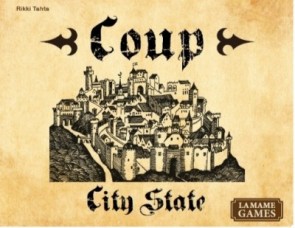Coup is an unassuming game. The first time through felt obvious, if pleasant. The second time through it felt a little richer. Every time it ended, I wanted to play again. I’ve now played between 10-12 games, and each time it goes just a little deeper. If it was any longer, I’d call it a grower. But I’ll have to settle for simply calling it the best “micro” game I’ve played since For Sale. Coup is subtle, devious, and layered. It has a depth that far outstrips its mere 15-minute playtime.
Each player has two cards, representing powerful nobles with whom they have influence. There are several actions you can take on your turn, but the most powerful actions require influence with a particular noble. The key is that all cards are facedown. Anyone can claim the ability to take any action on their turn, and if no one calls them out they get away with it. But if you have your doubts, you can call a challenge and force someone to prove they could take the action. If they were lying, they have to reveal one of their two cards, thus losing its ability. If you were wrong, you reveal one of YOUR cards. When someone has two face-up cards they’re out of the game, and the last person in wins.
Three of the actions can be performed by anyone, regardless of what cards they have. You can either take one coin, two coins, or spend seven coins to force someone to reveal one of their cards (the titular coup). There are five different types of cards, three of each in the deck. The Duke can take three coins at a go, and can prevent someone from trying to take the two-coins action. The Captain can “Extort” by stealing two coins from another player, but he can be stopped by another Captain. He can also be stopped by the Ambassador, who normally is used to exchange cards with those from the deck. There’s also the Assassin, who can spend three coins to force someone to reveal a card. But if you have the final type of card, the Contessa, you are immune to the Assassin’s knife.
As you can see, not all actions are created equal. The basic actions are much weaker than the others. Even among the character actions, a couple (the Duke and Captain especially) are much stronger and more useful. Some cards are so limited that the game forces an occasional bluff, if only to pretend you have the Ambassador and swap cards. And the other players will frequently find themselves forced to call a bluff, because to not do so would lose the game. The result is that people don’t usually lie until they sense they must, and the game does well pushing someone into that corner.
The real tricky part is learning how to read the game situation and the other players to sense when they SHOULD be bluffing, and when you should bluff yourself. Assuming someone is telling the truth, what cards do they have? Will you be able to get around them and coup them before they coup you? What cards are still in the deck? Of course, experienced players will know what you’re thinking and adjust accordingly. It is here that Coup’s greatness starts to reveal itself.
Bluffing is not the only skill that Coup rewards. The different powers may not all be the same strength, but they all are useful in different situations. A big part is learning how to utilize what you’ve been dealt to the greatest effect, completely separate from any lies being perpetuated. The Ambassador doesn’t seem that strong, but the ability to swap cards can really throw off the game for other players, and it gives you valuable knowledge of the cards still in the deck. And the Contessa seems worthless right up until someone assassinates you. And while the Duke and the Captain are great, getting too far ahead puts a big target on you. This part reminds me a little of Citadels, where any imbalances between the different roles is corrected in the metagame. The deck is small enough that counting cards is a pivotal skill as well.
And yet, all of this quality didn’t reveal itself right away. The roles felt off-center at first, since some of them seemed more useful. Without a sense of when to bluff, it all felt a little arbitrary. I confess, I thought it somewhat shallow after my first session. But the short duration means you can shuffle up and deal again right away, and enjoy it with a little more experience. It gets better every time I play it, and it’s now likely to get at least 2-3 plays in any given game night.
Despite the fact Coup is merely 15 cards and pile of plastic coins, it’s one of the tightest and most nuanced bluffing games I’ve played in a long time. It finds that tricky balance between mechanics and metagame, which means that a lot of different types of gamers can enjoy the game together and the experience doesn’t suffer. And besides that, I think about how to play different situations when I’m NOT playing. That’s a lot of mind games in 15 minutes, and it’s made Coup a staple of my game shelf.
Coup is published by Le Mame Games, who uses All About Games in Maine as their US store. All About Games runs a non-profit organization called The Game Loft that seeks to help youth in their community through after-school programs and games. As if you needed another reason to check out Coup, it’s good to know that a good game will also help support a good cause.
Nate Owens is a weekly columnist for Fortress: Ameritrash. He drinks too much coffee and likes the Star Wars prequels. You can read more of his mental illness at The Rumpus Room.
 Games
Games How to resolve AdBlock issue?
How to resolve AdBlock issue? 
















